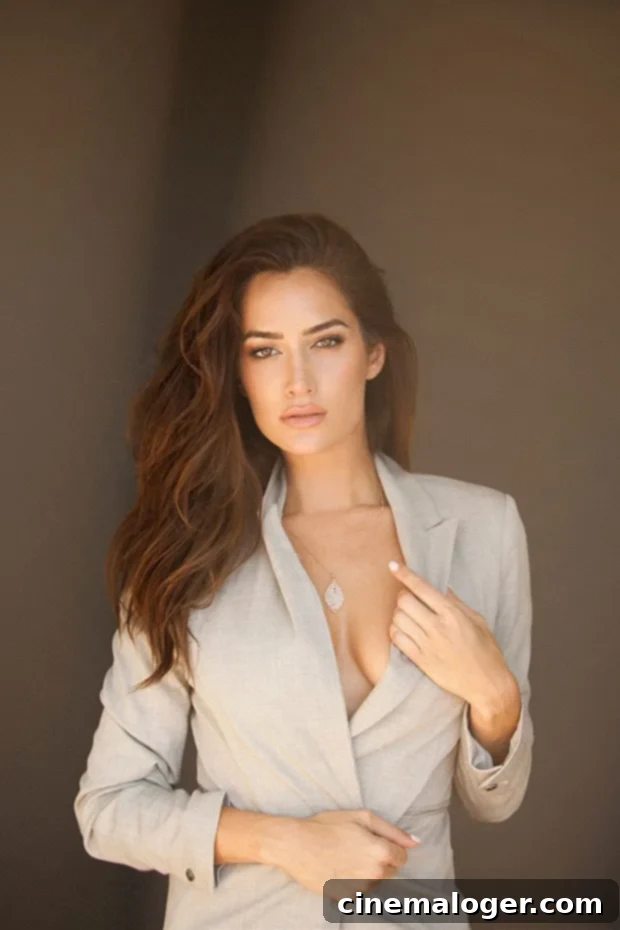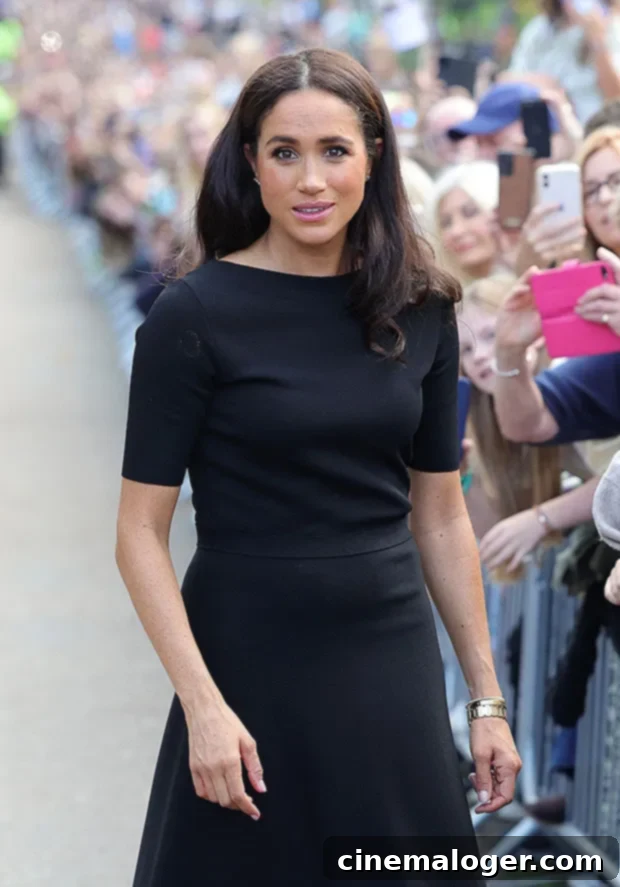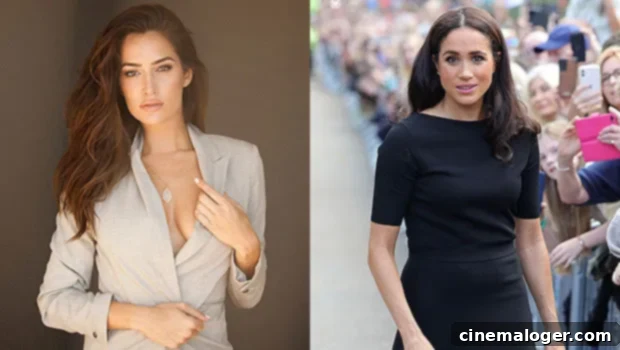Beyond the Briefcase: Donna Feldman on Her ‘Thankful’ ‘Deal or No Deal’ Journey After Meghan Markle’s ‘Bimbo’ Comments
The glitzy, high-stakes world of game shows often projects an image of pure entertainment, yet behind the scenes, personal experiences can vary dramatically. This reality has been brought into sharp focus by recent comments from Meghan Markle, the Duchess of Sussex, who candidly shared her feelings of being treated like a “bimbo” during her tenure as a briefcase model on the popular show Deal or No Deal. Her reflection ignited a conversation about objectification in entertainment, prompting other former “Briefcase Beauties” to share their own perspectives. Among them is Donna Feldman, a model and actress who held case No. 22 during the hit NBC show’s inaugural season. Feldman offered an exclusive interview to HollywoodLife, providing a contrasting viewpoint that highlights the multifaceted nature of experiences within the same industry role.
“I have certainly read Meghan’s comments regarding her perception of being treated like a ‘bimbo’ while she worked on Deal or No Deal, and I understand that everyone’s experience is personal,” Feldman stated, acknowledging the Duchess’s feelings. “However, I must respectfully disagree with the sentiment that this was the universal experience. During my time on the show, and from my interactions with other models, neither myself nor anyone I worked closely with ever felt treated in such a demeaning manner, in my honest opinion. It’s truly important to remember that individual experiences can diverge wildly, and I can only speak authentically from my own journey.”

Feldman, who has since built a robust career in acting and modeling, elaborated on the nature of the role itself. “Everybody who signs up for a position as a ‘Briefcase Beauty’ understands the nature of the job. Being hired based on one’s physical presentation and aesthetic appeal is inherently part of the territory,” the The Ovalactress continued. “Given that Deal or No Deal was one of NBC’s most prominent shows, it represented a significant platform. For anyone proactive and ambitious about their career, it was an unparalleled opportunity to gain national exposure, expand their professional network, and enhance their resume. I viewed it as a stepping stone. While numerous doors have opened for me because of my appearance, it’s ultimately my intelligence, engaging personality, unwavering professionalism, and strong work ethic that consistently secure me ongoing roles and long-term success.” Her statement underscores a belief in leveraging initial opportunities for broader career advancement, a common strategy in the entertainment industry.
Admitting that not every aspect of the job was glamorous, Donna shared some minor frustrations. “Of course, like any job, there were certain elements of working on the show that weren’t always ideal or ‘fantastic’,” she conceded. “For instance, we weren’t allowed to sit down while wearing stilettos to prevent wrinkling our dresses, and there was always the meticulous process of lining up to ensure everyone’s appearance met the show’s specific aesthetic requirements. These aspects always reminded me of why I was never a fan of beauty pageants – the intense focus on superficial perfection can certainly take a toll on one’s self-esteem. However, I consistently reminded myself and my colleagues that we were hired for our engaging presence and our ability to project positivity and a welcoming smile on screen. And it genuinely paid off, as we received so much heartfelt fan mail from viewers who truly appreciated seeing our smiling faces daily.” This perspective frames the perceived drawbacks as minor inconveniences within a larger, beneficial experience, focusing on the audience connection rather than personal discomfort.

The impact of Deal or No Deal on Feldman’s career has been profoundly positive, something she highlighted with immense gratitude. “Coincidentally, I recently had the pleasure of running into the show’s host, Howie Mandel, earlier this week, and I must reiterate that he truly is one of the kindest, most professional, and classiest individuals I have ever had the distinct pleasure of working alongside,” Donna added, emphasizing the positive environment. “I am profoundly thankful for every moment I spent on Deal or No Deal. The exposure from that show was instrumental: the producers featured me in a prominent TV commercial during the Olympics, and Maxim magazine included me on their esteemed list of the world’s most beautiful women. These were monumental career boosts, directly attributable to the show’s platform.”
Feldman continued to detail the tangible career advancements she secured: “I booked a significant television show as a series regular immediately after my first season on Deal or No Deal. Since then, I’ve graced countless magazine covers globally and have successfully cultivated a thriving 20-year career in the entertainment industry. This impressive trajectory encompasses high-profile modeling campaigns, roles in feature films, recurring acting appearances on various TV shows, and even the establishment of my own production company. All these achievements, in large part, stem from experiences like my time on Deal or No Deal. I remain incredibly grateful to NBC and to all the dedicated producers of the show for providing such a foundational opportunity in my professional life. Most recently, I’ve secured major advertising campaigns for upscale clients and am now proudly the new face of Cadillac’s most luxurious and expensive vehicle, the Celestiq, following its grand unveiling. This level of success, originating from that initial exposure, speaks volumes.”
Concluding her thoughts with a powerful statement on personal agency, Feldman declared, “Ultimately, it is up to each individual woman to define what experiences will empower her, or conversely, whether she chooses to frame an experience as an excuse to seek attention. I would confidently say that I have done remarkably well for someone who was supposedly hired solely to be a ‘bimbo’.” Her words underscore a belief in individual determination and the ability to transform perceived limitations into powerful springboards for success.
Donna Feldman’s positive recollection isn’t an isolated case among former briefcase models. It appears she isn’t the only one to express a divergent view from Meghan Markle’s recent claims. Real Housewives of Atlanta alum Claudia Jordan, who also graced the stage of the popular game show, articulated a similar sentiment. In an interview with TMZ, Jordan explained her differing perspective, stating, “I am not here to bash Meghan, nor am I attempting to invalidate her personal experience. It’s genuinely sad that she felt that way about her time on the show.” She added, “I honestly wasn’t aware that she harbored these feelings of being a ‘bimbo,’ because, from my viewpoint and understanding, that was certainly not the intention behind the show’s creation or the role itself.” Jordan’s comments echo Feldman’s, suggesting that while individual feelings are valid, they don’t necessarily reflect the show’s overarching ethos or the experiences of all its participants.
Before she captivated the world as the Duchess of Sussex following her marriage to Prince Harry, the former Suits star, Meghan Markle, held the position of a briefcase model during the second season of Deal or No Deal, appearing between 2006 and 2007, where she was famously associated with box No. 24. Meghan, now 41, first openly discussed her feelings about this chapter of her life when she engaged in a conversation with Paris Hilton on a compelling episode of her Spotify podcast, Archetypes. During this discussion, Meghan articulated her gratitude for the employment opportunity itself, stating, “I was thankful for the job, as it provided a steady income, but not for how it made me feel personally, which was that I wasn’t being valued for my intelligence or intellect.” She further clarified, “And by the way, I was surrounded by incredibly smart, talented women on that stage with me, all with various aspirations and backgrounds. However, that intellectual depth wasn’t the primary focus or the central reason we were there in that specific role.” Her recollection highlights a perceived dissonance between her internal sense of self and the external presentation required by the job.
Meghan elaborated on the emotional impact, explaining that she often concluded each episode of the show “with this gnawing pit in my stomach, burdened by the profound realization that I was so much more substantial than what was merely being objectified on that stage.” She continued, her voice resonating with her past frustrations, “I simply didn’t enjoy being forced into a role that felt entirely focused on physical appearance with very little room for substance or intellectual contribution, and that is precisely how it felt for me during that period. It was disheartening to be reduced to this very specific, narrow archetype: what I would call the word ‘bimbo.’” Her comments have sparked considerable debate, shedding light on the complexities of navigating early career roles in the entertainment industry and the lasting psychological effects of perceived objectification, especially for women seeking to be recognized for their multifaceted abilities beyond their looks. The differing accounts from Donna Feldman and Claudia Jordan, however, underscore a crucial point: while an industry role might present certain expectations, individual experiences and interpretations of those expectations can be profoundly unique, shaped by personal goals, resilience, and perspective. This fascinating divergence of views offers a valuable insight into the diverse journeys of women in media.
